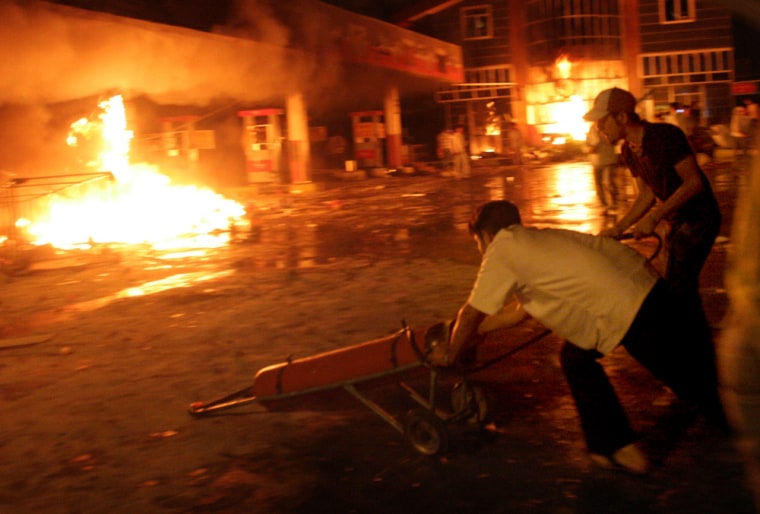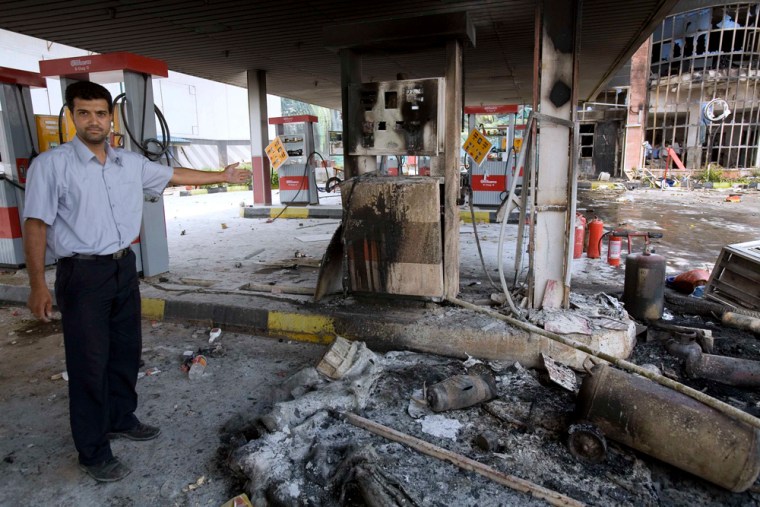Angry Iranian motorists lined up for gasoline for hours on Wednesday after the world’s fourth-largest oil exporter imposed fuel rationing, sparking chaotic scenes and the torching of at least two pump stations.
One Iranian news agency, Fars, said 12 gasoline stations were set ablaze in Tehran after the government’s announcement late on Tuesday, but only two could be independently confirmed.
Some drivers had scuffled while waiting to fill up their tanks before the rationing started at midnight. Others openly criticized President Mahmoud Ahmadinejad’s government, which came to power vowing to share out Iran’s oil wealth more fairly.
“We are swimming in oil and all they do is just put pressure on people,” said taxi driver Hasan Mohammadi.
Despite its huge energy reserves, Iran lacks refining capacity and must import about 40 percent of its gasoline, a sensitive issue when world powers have threatened new U.N. sanctions in a row with Tehran over its nuclear program.
25 percent increase
Seeking to rein in soaring consumption and costly imports, the government on May 22 raised the liter price by 25 percent to 1,000 rials (11 U.S. cents) but rationing was delayed.
Drivers rushed to pump stations after the Oil Ministry said the scheme would finally go ahead after weeks of confusion.

One fuel station in Pounak, a poorer area of the capital, was set alight while another in eastern Tehran was partially burnt, two of its pumps destroyed by fire, witnesses said.
Windows at Pounak were smashed, six pumps wrecked and walls blackened. State radio blamed “opportunistic elements.”
Police were not immediately available for comment on the total number of pump stations damaged.
“Last night’s riots were an expression of the anger of people with lower incomes,” said government employee Saeed Sameti, who said he had queued for five hours.
Motorists still faced long lines on Wednesday in a country where many see abundant and cheap fuel as a national right.
Inflation fears
Short of public transport, many rely on their cars or taxis to get around of the sprawling capital of 12 million people.
“I cannot tolerate more economic pressure,” said teacher Hasan Sanjari. “My monthly salary is $300. I have three sons.”
Some lawmakers were drafting a bill to stop rationing, IRNA news agency said, without saying how much support they had.
Parliament had argued for offering fuel above the rationed amount at market prices, a step opposed by the government which fears this would stoke inflation, already at 17 percent.
No announcement was made on Tuesday about whether drivers could buy extra fuel. An oil official said the government was being “deliberately ambiguous” to see how rationing worked, but economists said inflation would be affected whatever happened.
“Either they are going to offer (extra fuel) at a high price or there is going to be black market at a high price,” said Hatef Haeri, head of business consultancy ICG.
But he said Iran had no choice but to curb consumption because of the burden on state coffers. All fuel, whether imported or domestically produced, is sold at heavily subsidized prices, encouraging waste and smuggling.
Private cars will get 100 liters of gasoline a month but less if they also burn compressed natural gas, state TV said.
Sameti, the government employee, said he still backed the move but complained that foreign diplomats would get 600 liters per month: “I thought Ahmadinejad was against discrimination.”
All gasoline is already sold using electronic “smart” cards, but some drivers have not received them.
The United States, which is leading efforts to isolate Iran over its nuclear plans, has said Iran’s gasoline imports are a point of “leverage.” Washington accuses Iran of seeking to build nuclear weapons, a charge Tehran denies.
